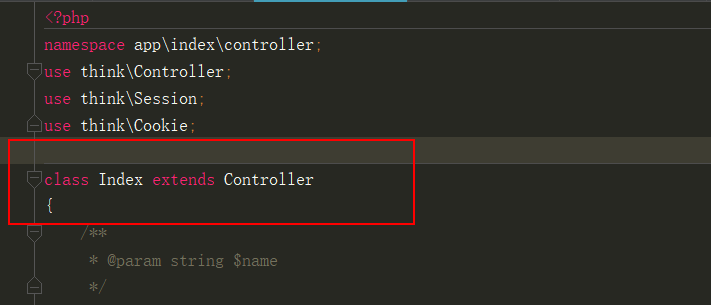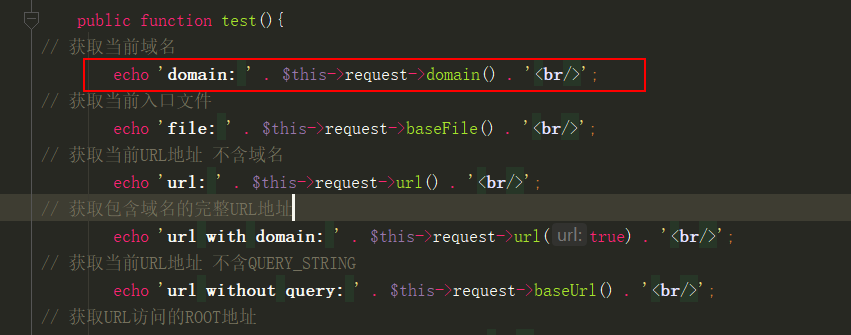Use of request
First method
Add request reference in the controller header

Then call the'instance'class in the method

Then call the method: 
public function index($name='name')
{
$request = Request::instance();
echo 'Request method:'.$request->method() . '<br/>';
echo 'Resource type:'.$request->type() . '<br/>';
echo 'Visit ip: '.$request->ip() . '<br/>';
echo 'Is it ajax Request:'.var_export($request->isAjax(), true) . '<br/>';
echo 'Request parameters:';
dump($request->param());
echo 'Request parameters: Include only name';
dump($request->only(['name']));
echo 'Request Parameters: Exclusion name';
dump($request->except(['name']));
echo 'Resource type:'.$request->type() . '<br/>';
echo '<br/>Operation:'.$request->action();
echo 'Get the current domain name:'.$request->domain() . '<br/>';
// Get the current entry file
echo 'Get the current entry file:'.$request->baseFile() . '<br/>';
// Get the current URL address without domain name
echo 'Get Current URL Address, without domain name:'.$request->url() . '<br/>';
// Get the full url address containing the domain name
echo 'Get the complete containing domain name url Address:'.$request->url(true) . '<br/>';
// Get URL address without QUERY_STRING
echo 'Obtain URL Address does not contain QUERY_STRING: '.$request->baseurl() . '<br/>';
// Get the ROOT address of URL access
echo 'Obtain URL Accessed ROOT Address:'.$request->root() . '<br/>';
// Get the ROOT address of URL access
echo 'Obtain URL Accessed ROOT Address:'.$request->root(true) . '<br/>';
// Get PATH_INFO information in the URL address
echo 'Obtain URL In address PATH_INFO Information:'.$request->pathinfo() . '<br/>';
// Gets the PATH_INFO information in the URL address, without the suffix
echo 'Obtain URL In address PATH_INFO Information, without suffix:'.$request->path() . '<br/>';
// Get suffix information in URL address
echo 'Obtain URL Suffix information in address:'.$request->ext() . '<br/>';
Session::set('name','thinkphp');
Cookie::set('name','thinkphp2');
dump($request->route());
dump($request->dispatch());
echo Session::get('name');
}The result is:

There are still some screenshots because the screen is not big enough, but you just need to know how to use them.
Second method
This method is simple but slightly cumbersome, as long as it references the Controller class and then inherits it, it can be called without first referencing request as above and then calling $request = Request::instance() in the method; then it can be used.
Referencing Controller is the same as referencing request above
use think\Controller

Then inherit the controller from the controller

Last call to'request'
Is it a little more trouble than the method?Each call needs to be preceded by $this->request

The overall code is:
public function test(){
// Get the current domain name
echo 'domain: ' . $this->request->domain() . '<br/>';
// Get the current entry file
echo 'file: ' . $this->request->baseFile() . '<br/>';
// Get the current URL address without a domain name
echo 'url: ' . $this->request->url() . '<br/>';
// Get the full URL address containing the domain name
echo 'url with domain: ' . $this->request->url(true) . '<br/>';
// Get the current URL address without QUERY_STRING
echo 'url without query: ' . $this->request->baseUrl() . '<br/>';
// Get the ROOT address of URL access
echo 'root:' . $this->request->root() . '<br/>';
// Get the ROOT address of URL access
echo 'root with domain: ' . $this->request->root(true) . '<br/>';
// Get PATH_INFO information in the URL address
echo 'pathinfo: ' . $this->request->pathinfo() . '<br/>';
// Get PATH_INFO information from URL address without suffix
echo 'pathinfo: ' . $this->request->path() . '<br/>';
// Get suffix information in URL address
echo 'ext: ' . $this->request->ext() . '<br/>';
echo "The current module name is" . $this->request->module();
echo "The current controller name is" . $this->request->controller();
echo "The current operation name is" . $this->request->action();
echo 'Request method:' . $this->request->method() . '<br/>';
echo 'Resource type:' . $this->request->type() . '<br/>';
echo 'Visit ip Address:' . $this->request->ip() . '<br/>';
echo 'Whether AJax Request:' . var_export($this->request->isAjax(), true) . '<br/>';
echo 'Request parameters:';
dump($this->request->param());
echo 'Request parameters: Include only name';
dump($this->request->only(['name']));
echo 'Request Parameters: Exclusion name';
dump($this->request->except(['name']));
}Final result graph: 